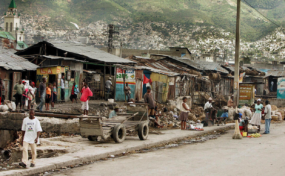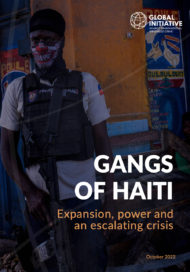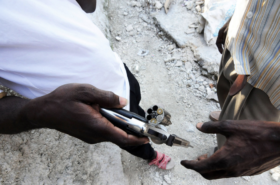Posted on 05 Feb 2024
It’s back to the drawing board for Kenyan authorities after the High Court on 26 January overturned President Ruto’s proposed deployment of police personnel to fight gangs in Haiti. The court decision leaves the plan in limbo. Meanwhile, the state has 14 days to appeal.
As mentioned in a previous article, Kenya had volunteered 1 000 police officers in response to Haiti’s appeal for international assistance against violent gangs, which prompted the United Nations Security Council (UNSC) to adopt a resolution authorizing a non-UN multinational security support (MSS) mission in Haiti in October 2023.
The High Court of Kenya temporarily blocked the Kenyan government’s proposal to lead a multinational security force to Haiti by sending police officers to stem gang violence. This was subjected to review by the High Court on 26 January 2024. The court decision means the deployment has been ruled illegal. Judge Chacha Mwita described the envisaged deployment as unconstitutional, null and void: ‘The effort, and in particular the attempt to deploy police officers to Haiti, must fall for lack of constitutional and legal foundation.’
The case was brought by opposition leader Ekuru Aukot of the Thirdway Alliance party on the basis that it violated the constitution, which provides for the deployment of the military abroad, but not police officers. The government has said it will appeal the decision.
In its haste to execute the peacekeeping mission to Haiti, the Kenyan government overlooked a number of obligations, including constitutional provisions; public participation and perception; and available alternatives, which should have been resolved ahead of the announcement. In the words of a Nairobi-based security and policy expert: ‘The entire process [of deployment] has been chaotic and wrapped in secrecy. It was obvious from the word go that the court would block it; even the government itself was aware.’
The court decision does not stop the Haitian deployment per se. Rather, it has found illegal the manner and process of execution, and declared illegal the assertion that the president has the authority to deploy police personnel abroad. By following due legal process, Kenya could in theory still deploy a police force to Haiti.
Kenyan authorities have three legal avenues to salvage the Haitian mission it volunteered to lead. They could appeal the court ruling; they could restart the process by invoking the reciprocity clause in Kenyan law; alternatively, they could propose sending an African Union-led force in which Kenya plays a lead role.
The government has until 15 February to challenge the court ruling. Authorities remain tight-lipped on the potential grounds for the challenge, but legal experts predict a protracted court tussle given the detailed and broad nature of Justice Mwita’s judgment. ‘It is going to be a very tough task to overturn it. Expect it to end in the Supreme Court, if they indeed appeal,’ said a state counsel. Given that Haiti is overwhelmed by violence, with gangs said to control over 80% of Port au Prince, Kenyan authorities can ill-afford a lengthy court case.
Reciprocity
Kenya’s law provides for a mechanism in which police officers can be deployed abroad if there is a reciprocal arrangement with the host country. However, there is no such arrangement currently in place between Kenya and Haiti. During court hearings, the Law Society of Kenya told the judge that a bilateral treaty should have been in place in order to operationalize a reciprocal agreement and give effect to the law that provides for reciprocity. An opposition legislator echoed this, arguing that the issue of reciprocity should have been determined ahead of the announcement to deploy.
The question now is, does Haiti have a government capable of executing a bilateral treaty with Kenya? Ruto believes it has, and says the Caribbean country has already embarked on the process towards such a treaty. Nonetheless, a proposed bilateral reciprocal agreement with Haiti must first be subjected to public participation. This is likely to be a challenge for Ruto’s government given the public cynicism with which the proposed police peacekeeping mission was met. In the first case, the plan to send a security force was conceptualized without prior public consultation. Secondly, Kenya faces its own domestic security crises – street gangs in Nairobi and Mombasa, cattle rustling in the north and the al-Shabaab threat on the coast, which all urgently demand police attention. Many believe Kenya can therefore not afford to spare police officers.
AU contingency
Authorities are toying with the idea of facilitating a police contingency under the ambit of the African Union (AU), in which Kenya plays a central role. How practicable this would be is unclear, but it may be coordinated under the AU mechanism for police cooperation (or AFRIPOL), where Kenya has been the chair of the General Assembly. One of AFRIPOL’s objectives is to enhance coordination among police forces deployed in the context of AU-led peace support operations, in terms of planning, mobilization, deployment and management.
Kenya has a record of participating in AU-led police missions abroad, among them INTERPOL and AFRIPOL’s first joint operation against human trafficking and migrant smuggling. During that operation, officers from the two agencies were deployed in the field to support local law enforcement in several countries.
Nelson Koech, the chairperson of the parliamentary committee on defence, intelligence and diaspora affairs, recently revealed that Kenya has police officers in South Sudan, and that they have in the past served elsewhere, including Somalia. These deployments have been part of AU-led missions.
Benefits
How Kenya resolves the imbroglio remains to be seen. However, hardly in dispute is the likely benefit of the Haitian mission for Kenya and its political leaders. Despite blocking the plan, Justice Mwita said: ‘It is in no doubt a great honour for Kenya to offer to lead the Multinational Security Support mission in Haiti. Similarly, Kenya has an obligation to join the community of nations in assisting Haiti as part of its international obligations.’
Like any other nation, it is not unexpected that Kenya would seek to use the mission to boost its image, and this involves providing diplomatic assistance where necessary. From June 2020 to December 2023, when it served on the UN Security Council, Kenya played a key role in negotiating global peace. Wishing to lead the Haitian multinational mission is thus in furtherance of this endeavour.
Sibi Nyaoga, writing for the Atlantic Council, observed: ‘A policing mission to Haiti could further raise Kenya’s profile as a champion of African interests.’ And according to Dr Luchetu Likaka, an expert in criminal justice and security management, ‘the deployment (to Haiti) could have raised Kenya’s profile as a champion of African interests’.
For President Ruto, the Haiti problem presents him with the opportunity to seek to be recognized as a leader with the courage, capacity and willingness to contribute to resolving geopolitical problems in situations where other heads of state may have cold feet. Achieving such global respect may sway even critics who still doubt his legitimacy as president following the highly disputed August presidential elections.
Kenya’s road to Haiti is likely to be long and winding.



